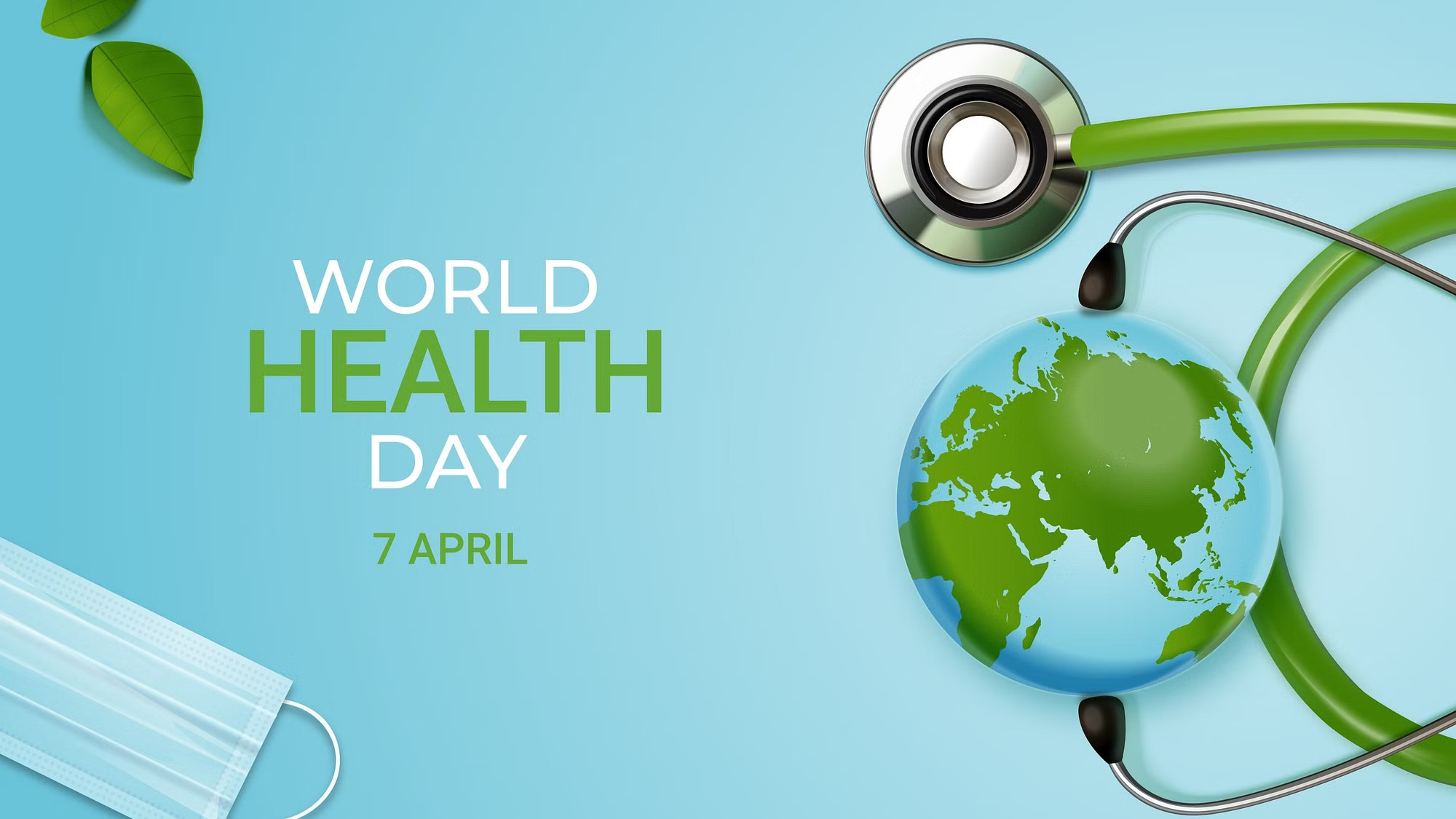

Featured
When Is World Health Day
Modified: January 2, 2024
Featured: Find out when World Health Day is celebrated and join in the global awareness campaign to promote health and well-being. Don't miss this important event!
Introduction
World Health Day is an annual event observed on the 7th of April, aimed at raising awareness about global health issues and promoting healthier living for individuals and communities worldwide. The day serves as a reminder of the importance of maintaining good health and the need for equal access to quality healthcare services.
Founded by the World Health Organization (WHO) in 1948, World Health Day has since become a significant platform for governments, organizations, doctors, and individuals to come together and address the pressing health challenges facing humanity. Each year, a specific theme is chosen to focus on a particular area of concern or to highlight a major health issue affecting the global population.
The primary goal of World Health Day is to provide a unique opportunity for people from all walks of life to engage in discussions, share knowledge, and take action towards improving global health outcomes. It serves as a call to action for governments, healthcare providers, and individuals to prioritize health and well-being as fundamental rights for all.
Throughout the years, World Health Day has played a vital role in raising awareness about various health issues such as the importance of vaccination, mental health, maternal and child care, and the impact of environmental factors on health. It has paved the way for groundbreaking initiatives and policies that have significantly contributed to saving lives and improving the overall health of individuals worldwide.
By uniting global efforts, World Health Day strives to create a healthier and more equitable world. It serves as a catalyst for change, prompting governments and organizations to invest in healthcare systems, strengthen health infrastructure, and address health disparities across different regions. It also inspires individuals to adopt healthier lifestyles, make informed choices, and become advocates for their own well-being and the well-being of their communities.
In the following sections, we will delve into the history of World Health Day, explore its themes, highlight the activities and events associated with the day, examine its global impact, and discuss its future implications. Through this comprehensive exploration, we hope to shed light on the significance of World Health Day and the role it plays in improving global health outcomes.
History of World Health Day
The inception of World Health Day can be traced back to April 7, 1948, when the World Health Organization (WHO) was established. To commemorate this milestone and bring attention to pressing global health issues, the first World Health Day was celebrated on the same date in 1950.
Since its establishment, World Health Day has served as an annual occasion for raising awareness and mobilizing action on specific health challenges. It provides a unique opportunity for governments, health organizations, and communities to come together and address critical health issues that affect societies worldwide.
Over the years, World Health Day has helped shape global health policies and initiatives. It has served as a driving force behind transformative campaigns and interventions that have saved countless lives and improved health outcomes.
Each year, a different theme is chosen for World Health Day, focusing on a specific area of global health concern. The selected theme serves as a guide for activities, events, and awareness campaigns carried out on and around April 7th.
Some significant milestones in the history of World Health Day include:
- 1955 – Fight against Malaria: The first time a specific health issue was highlighted on World Health Day, with a focus on raising awareness about the prevention and control of malaria, a disease that affects millions of people, primarily in tropical and subtropical regions.
- 1978 – Expansion of Primary Health Care: The Alma-Ata Declaration was adopted on World Health Day, emphasizing the significance of primary healthcare as the foundation for achieving health for all. This declaration laid the groundwork for universal healthcare and equitable access to essential health services.
- 1988 – Immunization: The theme of World Health Day was centered around immunization, aiming to increase awareness about the importance of vaccines in preventing infectious diseases and reducing child mortality rates.
- 1995 – Global Polio Eradication: World Health Day marked a crucial milestone in the global effort to eradicate polio. The year 2000 was set as the target for eliminating polio worldwide, and significant progress has been made since then.
- 2010 – Urbanization and Health: Recognizing the impact of rapid urban growth on health, this year’s theme focused on raising awareness about the need for healthy urban environments and access to essential health services in urban settings.
These are just a few examples of the themes and milestones celebrated on World Health Day. Each year, the chosen themes reflect the changing global health landscape and the ever-evolving challenges faced by communities around the world.
Now that we have explored the history of World Health Day, let’s dive into the significance of this observance and its role in raising awareness and promoting global health.
Importance of World Health Day
World Health Day holds immense importance in the global health community and beyond. It serves as a crucial platform for raising awareness, advocating for health equity, and strengthening international cooperation to tackle pressing health challenges. Here are some key reasons why World Health Day is significant:
- Raising Awareness: World Health Day plays a vital role in bringing global health issues to the forefront of public consciousness. Each year, a specific theme is chosen to shed light on a particular health concern, fostering understanding and knowledge among individuals, communities, and policymakers. By raising awareness, World Health Day helps break down stigmas, dispel myths, and promote evidence-based health practices.
- Prioritizing Health: The observance of World Health Day sends a powerful message to governments, decision-makers, and healthcare providers about the importance of prioritizing health. It serves as a reminder that health is a fundamental human right and demands investment in comprehensive and accessible healthcare systems. By highlighting health on a global stage, World Health Day advocates for policies and resources that address the diverse health needs of populations worldwide.
- Promoting Health Equity: World Health Day emphasizes the need to achieve health equity and ensure that everyone, regardless of their socio-economic status, gender, or geographical location, has equal access to quality healthcare services. It shines a spotlight on health disparities and calls for targeted actions to bridge the gaps in healthcare access and outcomes. By promoting health equity, World Health Day contributes to the overall well-being and prosperity of societies.
- Mobilizing Action: World Health Day serves as a catalyst for action by mobilizing individuals, communities, and organizations to take concrete steps towards improving health. It encourages people to make personal lifestyle changes, such as adopting healthier diets, increasing physical activity, and eliminating harmful habits. It also prompts governments and institutions to implement policies, programs, and initiatives that address the root causes of health problems and promote sustainable solutions.
- Fostering Collaboration: Collaboration is crucial in addressing complex health issues. World Health Day brings together diverse stakeholders, including governments, healthcare professionals, non-profit organizations, and the private sector, to exchange knowledge, share best practices, and coordinate efforts. By fostering collaboration, World Health Day enables collective action that is more effective in addressing health challenges and achieving widespread impact.
Overall, World Health Day is essential in promoting a global culture of health and inspiring individuals and communities to take ownership of their well-being. It encourages governments and organizations to invest in robust healthcare systems and policies that prioritize preventive care, address health disparities, and ensure equitable access to quality healthcare services for all.
In the following sections, we will explore the different themes of World Health Day over the years, the activities and events associated with this global observance, and its significant impact on a global scale.
Themes of World Health Day
Each year, World Health Day is celebrated with a specific theme that focuses on a particular health issue or priority area. These themes are carefully chosen to address pressing global health challenges, raise awareness, and mobilize action. Let’s explore some of the notable themes of World Health Day:
- 2022 – Building a Fairer, Healthier World: The theme for 2022 emphasizes the urgent need to address health inequalities and work towards creating a fairer and healthier world for all. It highlights the importance of access to healthcare, social protection, and health services for marginalized and vulnerable populations.
- 2021 – Building a Fairer, Healthier World for Everyone: Recognizing the impact of the COVID-19 pandemic, the theme for 2021 focused on the importance of health equity and the need to ensure fair access to healthcare and essential services, especially for marginalized communities.
- 2020 – Support Nurses and Midwives: In celebration of the International Year of the Nurse and the Midwife, World Health Day 2020 aimed to highlight the crucial role of nurses and midwives in providing healthcare and the need for increased investment in these professions.
- 2019 – Universal Health Coverage: The theme of 2019 centered around the goal of achieving universal health coverage, ensuring that everyone has access to essential healthcare services without experiencing financial hardship. It aimed to raise awareness about the importance of healthcare accessibility and affordability.
- 2018 – Universal Health Coverage: Continuing the focus on universal health coverage, the 2018 theme aimed to inspire governments, policymakers, and individuals to take concrete steps towards ensuring that everyone has access to quality healthcare without facing financial hardship.
These themes are just a snapshot of the diverse range of health issues addressed by World Health Day over the years. Other themes have included mental health, non-communicable diseases, vector-borne diseases, healthy aging, vaccination, environmental health, and many more.
By selecting these themes, World Health Day provides a platform for highlighting critical health challenges, promoting evidence-based practices, and encouraging collective action. It empowers individuals, communities, and organizations to engage in discussions, share knowledge, and contribute to finding solutions to global health issues.
Now that we have explored the themes of World Health Day, let’s delve into the various activities and events that take place on this significant day.
Activities and Events on World Health Day
World Health Day is marked by a wide array of activities and events around the globe. These initiatives aim to raise awareness, educate communities, promote healthy lifestyles, and advocate for better health outcomes. Let’s explore some of the common activities and events that take place on World Health Day:
- Awareness Campaigns: Governments, non-profit organizations, healthcare institutions, and community groups organize awareness campaigns to educate the public about the chosen theme of World Health Day. These campaigns utilize various communication channels, including social media, traditional media, and community outreach, to disseminate information, debunk myths, and promote healthy behaviors.
- Health Screenings and Check-ups: Many health organizations and clinics offer free or discounted health screenings and check-ups on World Health Day. These screenings cover a range of health parameters, such as blood pressure, blood sugar levels, cholesterol levels, and body mass index (BMI). The aim is to encourage individuals to take a proactive approach to their health and detect any underlying health issues early.
- Health Talks and Webinars: Experts and healthcare professionals often give talks, presentations, and webinars centered around the theme of World Health Day. These educational sessions provide valuable insights into specific health topics, address common misconceptions, and offer practical tips for leading a healthier lifestyle. They also create opportunities for interactive discussions and Q&A sessions with the audience.
- Community Health Fairs: Community health fairs are organized to bring healthcare services and resources to the local community. These events often feature interactive exhibits, health information booths, and demonstrations. Community members can access health screenings, receive educational materials, and engage in activities promoting healthy habits, such as exercise classes, cooking demonstrations, and stress management workshops.
- Policy Discussions and Advocacy Initiatives: World Health Day serves as a platform to engage policymakers and advocate for meaningful policy changes. Policy discussions and forums are organized to address the specific health challenges associated with the theme of the year. These discussions bring together experts, policymakers, and decision-makers to exchange ideas, explore evidence-based approaches, and develop strategies to improve health outcomes at the national and global levels.
- Community Engagement Activities: Communities actively participate in World Health Day through a variety of engagement activities. These can include community clean-up drives, walking or running events, health and wellness workshops, and health-themed competitions. These activities empower individuals to take ownership of their health and inspire others to do the same.
The diverse range of activities and events on World Health Day reflects the collective commitment to improving health and well-being globally. By participating in these initiatives, individuals and communities contribute to raising awareness, promoting healthy behaviors, and advocating for policies that prioritize health.
Now that we have explored the activities and events of World Health Day, let’s examine the global impact this observance has had on health outcomes around the world.
Global Impact of World Health Day
World Health Day has had a profound global impact in raising awareness, driving action, and improving health outcomes worldwide. Through its themes, activities, and events, World Health Day has made significant contributions in the following areas:
- Highlighting Health Issues: World Health Day has played a crucial role in bringing attention to pressing health issues that might otherwise go unnoticed. By shining a spotlight on specific topics each year, it raises awareness among individuals, communities, and policymakers, fostering knowledge and understanding of global health challenges.
- Policy Reform and Implementation: The observance of World Health Day has often led to policy reforms and the implementation of evidence-based practices. Governments and institutions take advantage of this global platform to assess their healthcare systems, develop targeted policies, and allocate resources to address the highlighted health issues.
- Healthcare Access and Equity: World Health Day has consistently advocated for equitable access to healthcare services. The observance has prompted governments, organizations, and stakeholders to take concrete actions towards ensuring that marginalized and underserved communities have access to quality healthcare. This focus on healthcare access and equity has helped reduce health disparities and improve health outcomes for vulnerable populations.
- Behavioral Change and Health Promotion: World Health Day campaigns and events have a significant impact on individuals’ behaviors and lifestyle choices. By providing educational resources and promoting healthy habits, such as regular exercise, healthy eating, and disease prevention measures, World Health Day encourages individuals to make positive changes that can reduce the burden of preventable diseases.
- Partnerships and Collaboration: World Health Day fosters partnerships and collaboration among diverse stakeholders, including governments, health organizations, non-profit entities, and communities. These collaborations allow for the sharing of expertise, resources, and best practices, leading to more effective strategies and interventions to address global health challenges.
- Public Engagement and Empowerment: World Health Day engages the public in discussions, activities, and events that empower individuals to take charge of their health and well-being. By providing knowledge, resources, and platforms for participation, World Health Day encourages individuals and communities to be proactive in promoting health and advocating for their healthcare needs.
The global impact of World Health Day can be seen in the improved health outcomes, increased healthcare access, and the adoption of evidence-based practices worldwide. Through its initiatives, World Health Day has raised awareness, catalyzed policy changes, and fostered collaboration, contributing to enhanced health systems and healthier populations.
As World Health Day continues to evolve and address the health challenges of our world, its impact will remain instrumental in driving positive change and improving the health and well-being of communities across the globe.
Now, let’s explore the future implications and prospects of World Health Day.
Future of World Health Day
The future of World Health Day holds great promise for further advancing global health initiatives and addressing emerging health challenges. As the world continues to evolve, so too must the observance of World Health Day to remain relevant and impactful. Here are some key considerations and prospects for the future of World Health Day:
- Adapting to Changing Health Landscape: World Health Day must remain adaptable to the changing health landscape. It should address emerging health challenges such as climate change, antimicrobial resistance, mental health, digital health, and access to essential medicines. By staying responsive to these pressing issues, World Health Day can contribute to shaping policies and actions that address the evolving health needs of individuals and communities.
- Harnessing Technological Advancements: The future of World Health Day lies in leveraging technological advancements to improve healthcare access, delivery, and outcomes. It should embrace digital platforms, remote healthcare services, telemedicine, and health monitoring technologies to enhance healthcare delivery and bridge gaps in healthcare access, particularly in underserved regions.
- Promoting Health Equity in a Post-COVID-19 World: The COVID-19 pandemic has exposed and exacerbated existing health inequities. In the future, World Health Day can play a pivotal role in advocating for health equity, strengthening health systems, and ensuring the availability of vaccines, treatments, and essential healthcare services to all individuals, regardless of their socio-economic status or geographical location.
- Empowering Communities and Individuals: World Health Day should prioritize community engagement and empowerment. It should encourage individuals to take an active role in their health and well-being, promoting health literacy, healthy behaviors, and self-advocacy. By fostering a sense of ownership, World Health Day can foster long-lasting behavior change and promote sustainable health outcomes.
- Collaboration and Partnerships: The success of World Health Day relies on strong collaborations and partnerships among governments, international organizations, healthcare providers, communities, and individuals. The future of World Health Day should continue to nurture these collaborations, bringing together diverse stakeholders to exchange knowledge, share resources, and implement effective interventions that address complex health challenges.
- Building Resilient Health Systems: World Health Day can contribute to building resilient health systems that are capable of responding to crises and ensuring access to essential healthcare during emergencies. It should emphasize the importance of preventive care, healthcare infrastructure, and health workforce development to strengthen healthcare systems and improve health outcomes.
The future of World Health Day lies in its ability to adapt, innovate, and mobilize action to address the evolving health needs of our global population. By embracing new technologies, promoting health equity, empowering communities, fostering collaborations, and strengthening health systems, World Health Day can continue to drive positive change and make a lasting impact on global health outcomes.
Now, let’s conclude our exploration of World Health Day and reflect on the significance of this observance in promoting a healthier and more equitable world for all.
Conclusion
World Health Day, observed annually on April 7th, serves as a vital platform for raising awareness about global health issues and inspiring action towards improving health outcomes. Since its inception in 1950, World Health Day has played a significant role in advocating for health equity, prioritizing healthcare access, and addressing pressing health challenges.
The observance of World Health Day has showcased a rich history of themes that shed light on diverse health issues, ranging from infectious diseases and maternal health to mental health and universal health coverage. These themes have sparked conversations, driven policy changes, and mobilized collective action towards better health for all.
Through diverse activities and events, World Health Day engages individuals, communities, and organizations worldwide. Awareness campaigns, health screenings, educational talks, community health fairs, and policy discussions empower individuals to take charge of their health and encourage policymakers to prioritize health on national and global agendas.
The impact of World Health Day extends beyond its annual observance. It has contributed to policy reforms, improved healthcare access and affordability, and fostered collaborations among stakeholders. The observance has sparked behavioral changes, promoted preventive care, and supported efforts to achieve health equity.
The future of World Health Day lies in its adaptability and responsiveness to emerging health challenges. It should harness technological advancements, promote health equity in the aftermath of the COVID-19 pandemic, empower communities and individuals, foster collaborations, and strengthen health systems.
As we look towards the future, let us recognize the significant role World Health Day plays in creating a fairer, healthier world for all. It is a call to action to prioritize health, address health disparities, and work towards achieving universal access to quality healthcare services. World Health Day inspires individuals, communities, and governments to continue striving for better health outcomes and to advocate for policies that promote the well-being of all individuals, regardless of their background or circumstances.
Together, let us embrace the ethos of World Health Day and continue our collective efforts to build healthier, more equitable societies where everyone has the opportunity to thrive and lead a fulfilling life.




